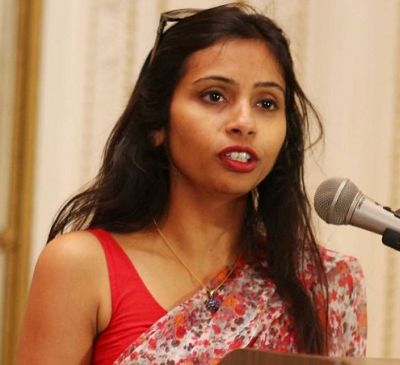 The dent on India-US relations caused by L'affaire Devyani will not remain for long as those will be determined by strategic and economic considerations, says Ambassador T P Sreenivasan.
The dent on India-US relations caused by L'affaire Devyani will not remain for long as those will be determined by strategic and economic considerations, says Ambassador T P Sreenivasan.
The only possible end to the Devyani imbroglio has now come, with the US side maintaining its position that she is guilty of fraud and, at the same time, conceding that she now has full diplomatic immunity and that she can leave the country.
The seemingly sudden developments must have been carefully choreographed by the two sides. This was inevitable as neither side wanted this incident to do lasting damage to bilateral relations.
The end could not have come sooner. Fatigue had begun to set in this case as the public on both sides were feeling jittery that both India and the US were blowing the issue out of proportion.
Several Indian Americans at the Pravasi Bharatiya Divas sounded bewildered that such a minor issue was allowed to sour the relationship. They were quite concerned that the US-India roller-coaster had descended so low that it would take Herculean efforts to raise it back to the level at which they stood last year.
The strong position of the US media seemed to make an impact on them. They began shifting attention to the plight of other Indians worldwide, who did not get the kind of attention that Devyani got from the Indian authorities.
On the Indian side, public opinion was fast moving against Devyani and the Indian diplomats in general. They recognised the need for solidarity to get Devyani back to the country, but felt uneasy about the continuing crisis.
The negative stories about Devyani, which came out in the press, were also being talked about in private. The end of the drama, however unsatisfactory, has come as welcome relief.
The transfer of Devyani from the consulate to the Permanent Mission of India to the United Nations was a master stroke, which provided the face-saving device for both sides. But in the process, our case that the consular officers too had immunity against arrest and harassment became weak.
Our reciprocal measures also contributed to dilution of the rights of our consular officers. It was pointed out that the US had secret agreements with some countries to provide protection to consular officers over and above the provisions of the Vienna Convention. The US may seek such an agreement with India to escape the new restraints imposed on the US diplomatic and consular corps in India.
The US request for withdrawal of Devyani's immunity on January 9, 2014, was a formality and naturally, the government turned it down. The formal position of the US is that the charges would stay till she ceases to have immunity.
In the future, her diplomatic passport will not enable her to enjoy immunity. She will need a G-1 visa to enter the US without fear of legal action.
This will cause considerable hardship to her, but that appears inevitable.
A silver lining of the whole episode is that the issue of India Based Domestic Assistants, which has been haunting Indian diplomats in the US and in some other countries will now be resolved.
The only way is to declare IBDAs as part of the official team and take them out of the operation of domestic laws.
The dent on India-US relations will not remain for long as those will be determined by strategic and economic considerations. The roller-coaster has already begun to slide upwards with the US spokesperson emphasising that the dialogue would continue.
Interestingly, some of the inherent features in India-US relations, such as the mindset, on both sides manifested themselves in the recent debate. They will also be addressed in the new dialogue.
T P Sreenivasan, Indian Foreign Service, 1967, is a former Ambassador of India and Governor for India of the IAEA. He is currently the Executive Vice-Chairman, Kerala State Higher Education Council and Director General, Kerala International Centre.










